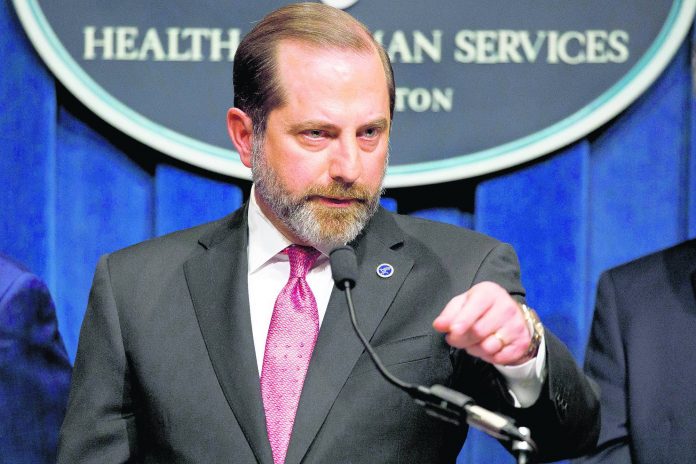
The U.S. secretary of Health and Human Services is scheduled to visit Taiwan in coming days in the highest-level visit by an American Cabinet official since the break in formal diplomatic relations between Washington and Taipei in 1979.
The visit by Alex Azar, and especially a planned meeting with Taiwan’s president, will likely create new friction between the U.S. and China, which claims Taiwan as its own territory to be annexed by force if necessary. Taiwan is a key irritant in the troubled relationship between the world’s two largest economies, which are also at odds over trade, technology, territorial claims in the South China Sea and China’s response to the coronavirus pandemic.
In Beijing, foreign ministry spokesman Wang Wenbin said China has lodged “solemn complaints” over the visit with U.S. officials in both Beijing and Washington.
“The Taiwan issue is the most important and sensitive issue in China-U.S. relations,” Wang said at a daily briefing. He said Washington needs to stop all forms of official contact with Taiwan and make good on its commitment to Beijing to “avoid serious damage to China-U.S. relations and peace and stability across the Taiwan Strait.”
The U.S. maintains only unofficial ties with Taiwan in deference to Beijing, but is the island’s most important ally and provider of defense equipment.
The American Institute in Taiwan, which operates as Washington’s de facto embassy on the island, said Wednesday that Azar’s “historic visit will strengthen the U.S.-Taiwan partnership and enhance U.S-Taiwan cooperation to combat the global COVID-19 pandemic.”
In a tweet, Taiwan’s Ministry of Foreign Affairs said it looks forward to welcoming Azar and his delegation. “This is the highest-level visit by a U.S. Cabinet official since 1979! Taiwan and the U.S. are like minded partners cooperating closely in combating coronavirus and promoting freedom democracy & human rights worldwide.”
The ministry said Azar will meet with independence-minded President Tsai Ing-wen, with whose government Beijing cut off virtually all contacts four years ago, and with Foreign Minister Joseph Wu and top health officials.
Tsai tweeted to Azar that “Your timely visit is another testament to the strong Taiwan-US partnership based on our longstanding friendship & shared values.”
AIT said Azar will discuss the disease, global health and Taiwan’s role as a supplier of medical equipment and technology.
The visit is believed to be scheduled for next week, although AIT said details on the timing and agenda would be announced later.
Azar would be the first HHS secretary to visit Taiwan and the first Cabinet member to visit in six years, the last being then-Environmental Protection Agency Administrator Gina McCarthy. His Cabinet ranking is higher than previous U.S. visitors.
“Taiwan has been a model of transparency and cooperation in global health during the COVID-19 pandemic and long before it,” Azar said in the AIT statement. “This trip represents an opportunity to strengthen our economic and public health cooperation with Taiwan, especially as the United States and other countries work to strengthen and diversify our sources for crucial medical products.”
Azar’s visit was facilitated by the 2018 passage of the Taiwan Travel Act that encouraged sending higher-level officials to Taiwan after decades during which such contacts were rare and freighted with safeguards to avoid roiling ties with Beijing.
McCarthy’s visit to Taiwan in 2014 sparked a protest from China’s foreign ministry, which accused the U.S. of betraying commitments made to it about maintaining only unofficial links with Taipei.
China objects to all official contact between Taiwan and the U.S. But its increasing diplomatic pressure, including poaching Taiwan’s few remaining diplomatic allies and excluding it from international gatherings including the World Health Assembly, have fostered already considerable bipartisan sympathy for Taipei in Washington and prompted new measures to strengthen governmental and military ties.
Taiwan’s strong performance in handling its COVID-19 outbreak has also won it plaudits while highlighting its exclusion from the World Health Organization and other U.N. bodies. Despite its close proximity to China, where the global pandemic is believed to have originated, the island of 23 million has recorded just 476 cases and seven deaths from COVID-19, largely as a result of rigorous testing and case tracing.
“In contrast to authoritarian systems, U.S. and Taiwan societies and economies are uniquely equipped to drive global progress in areas such as medicine and science to help the world tackle emerging threats,” AIT said. “The COVID-19 pandemic is the most recent example of joint U.S.-Taiwan efforts to confront global challenges for the good of the world.”



















